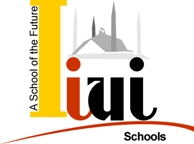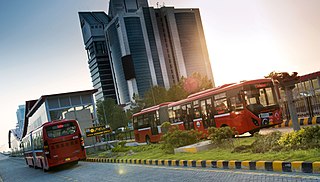Civil Lines | |
|---|---|
Neighbourhood | |
| Country | |
| Province | Punjab (Pakistan) |
| District | Rawalpindi |
| Time zone | UTC+5 (PST) |
Civil Lines is a neighbourhood locality in Rawalpindi, Punjab. [1] It was built by the British Raj for the civil officers.
Civil Lines | |
|---|---|
Neighbourhood | |
| Country | |
| Province | Punjab (Pakistan) |
| District | Rawalpindi |
| Time zone | UTC+5 (PST) |
Civil Lines is a neighbourhood locality in Rawalpindi, Punjab. [1] It was built by the British Raj for the civil officers.

Rawalpindi is the third-largest city in the Pakistani province of Punjab. It is a commercial and metropolitan city being the fourth most populous in previous census of 2017 in Pakistan. It is located near the Soan River in north-western Punjab, and is the third-largest Punjabi-speaking city in the world. Rawalpindi is situated close to Pakistan's capital Islamabad, and the two are jointly known as the "twin cities" because of the social and economic links between them.

Murree is a mountain resort city, located in the Galyat region of the Pir Panjal Range, within the Murree District of Punjab, Pakistan. It forms the outskirts of the Islamabad-Rawalpindi metropolitan area, and is about 30 km (19 mi) northeast of Islamabad. It has average altitude of 2,291 metres (7,516 ft). The British built this town during their rule to escape the scorching heat in the plains of Punjab during the summer.

The Ministry of Railways is a ministry of the Government of Pakistan tasked with planning, administrating and overseeing government policies for the development of the national rail network, Pakistan Railways. Originally a department of the Ministry of Communications, in May 1974 it formed into an autonomous ministry of the federal government. The ministry headquarters is located at Block D of the Pak Secretariat in Islamabad.

Rawalpindi is a tehsil - an administrative subdivision - of Rawalpindi District in the western part of the Punjab province, Pakistan, it contains the district capital - the city of Rawalpindi.
The Civil Lines is a residential area and one of the 3 subdivisions of the Central Delhi district of Delhi in India. It is one of the 12 zones under the Municipal Corporation of Delhi. It was the hub of European-style hotels in the city until New Delhi came into being in 1911. The official residence of the Lieutenant Governor of Delhi is also located at Raj Niwas Marg, Civil Lines.

The Syed Kasran is a village with a population of about 10,000. The village was built by two brothers who came from Gujrat, Syed Muhammad and Syed Mehmood, son of Zain ul Abideen. They came to this region at the request of Raja Sarang wal e Rawat. They belonged to the Syed family, which the village is named after. It has a Mazaahar of Shah Nazar and Shah Diwan Kazmi. Syed Kasran also Syed is a town in Gujar Khan Tehsil Punjab, Pakistan. Syed Kasran is also chief town of Union Council Syed Kasran which is an administrative subdivision of the Tehsil.
Chaklala is a major suburban town of Rawalpindi in the Punjab province of Pakistan.
Saddar, Rawalpindi, Pakistan, is the main commercial hub of Rawalpindi Cantonment. It is located between the Mall road and the main railway lines connecting Rawalpindi with down-country. It has some major business and commercial centres, main branches of major Pakistani banks, and residential areas of British colonial era. Saddar is a home to a dense cluster of residential and commercial buildings. Shops as well as shopping malls offer a diverse range of locally manufactured products and imported items. Chota Bazaar is a famous shopping area in northern Saddar.
The National University of Modern Languages, Rawalpindi, formerly known as APCOMS, is a university branch located in Rawalpindi, Punjab, Pakistan and is part of National University of Modern Languages.

IIUI Schools, is a school system launched by International Islamic University, Islamabad in 2010 on occasion of its Silver Jubilee (1985–2010). The IIUI Schools, also known as, International Islamic University Schools, are the first school system established by a university in Pakistan, aimed to assist in creating high achievers with an advanced level of independent thinking, impeccable character and remarkable confidence in line with the teachings and norms taught by Islam.

The transport system in Islamabad, the capital of Pakistan, connects it with all major cities and towns via regular trains and bus services running mostly from the neighbouring city of Rawalpindi.

The Federal Government Educational Institutions (Cantonments/Garrisons) Directorate or FGEI (C/G) Dte, is a school system under the administration of Pakistan Army

The General Headquarters is the headquarters of the Pakistan Army, located in the Chaklala at the vicinity of Rawalpindi, adjacent to the Joint Staff Headquarters.
Civil Lines are the residential neighbourhoods developed during the British Raj for its senior civilian officers like Divisional commissioner and District magistrate. These townships were built all over the Indian subcontinent and were allotted to civil officers in the respective countries. This is distinct from Forts and Cantonments, which were expressedly military establishments.
Nawabshah Junction Railway Station is located in the city of Nawabshah on main railway line in Pakistan. It is a major railway station of Pakistan Railways and was the junction of Nawabshah-Tando Adam loop and Nawabshah-Mirpur Khas meter gauge railway lines. It is the stop of almost all Express trains. The station is staffed and has advance and current reservation offices. Food stalls are also located on it platforms.

The Rawalpindi-Islamabad Metrobus is a 83.6 km (51.9 mi) bus rapid transit system operating in the Islamabad–Rawalpindi metropolitan area of Pakistan. It consists of four routes, namely the Red, Orange, Blue, and Green Lines. The Red and Orange Lines have dedicated lanes with proper stations built along them, while the Blue and Green Lines currently run along the Islamabad Expressway and Srinagar Highway respectively, with regular traffic.
Tahir Shah is a Pakistani former first-class cricketer. He is now an umpire and stood in matches in the 2015–16 Quaid-e-Azam Trophy.

The proposal of establishing Army Institute of Military History (AIMH) was approved on 2 June 2017 by Chief of Army Staff (COAS) and inaugurated AIMH on 28 July 2021. AIMH has been set up as a semi-autonomous research body with a broad outreach both within the civilian and military domains.